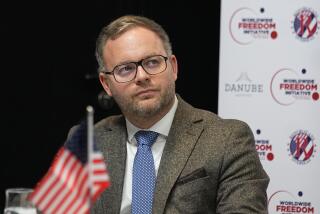Hungary’s Premier Faces Spy Allegation
BUDAPEST, Hungary — Prime Minister Peter Medgyessy was accused Tuesday of having secretly served Communist Hungary’s counter-espionage service, a charge that triggered doubts about whether he can remain in office.
An ex-Communist and former banker, Medgyessy denied any wrongdoing, but not the allegation itself, which he acknowledged could be politically damaging.
The recently elected prime minister’s failure to immediately issue a clear denial to parliament triggered an opposition warning of a potential constitutional crisis.
“If I feel that the confidence [of the ruling parties] becomes shaky toward me, then I will resign,” Medgyessy said on television Tuesday evening. “But as I feel their confidence now, I will continue in my work.”
The right-leaning daily newspaper Magyar Nemzet splashed the charge on its front page Tuesday, running a photocopy of a March 1978 document that promoted “Comrade D-209” to the rank of first lieutenant in the service aimed against foreign spies.
The document did not directly identify the person receiving the promotion, but his date of birth and mother’s maiden name are the same as Medgyessy’s.
Medgyessy, 59, who heads a center-left coalition that took office only last month, dismissed the accusation as a political ploy.
“The article is about trying to smear politicians to get people to talk about topics of interest to a few instead of what really interests the country,” Medgyessy said.
Prime Minister Evasive
But the prime minister implied in several ways that the charge might be true. “Either I had a strictly confidential position--then I protected Hungarian interests and then it is strictly confidential, so I cannot answer--or the Magyar Nemzet article is not true,” he told parliament.
The prime minister also referred his parliamentary critics to an interview he gave last year that defended counterintelligence work.
“There are situations in one’s life when, in the interests of national sovereignty, it’s necessary to take steps which protect the country’s interests against foreign intelligence, be they [the Soviet] KGB or Western ones,” he said in those comments to the daily Magyar Hirlap. At the time, it appeared that he was speaking in general terms, not about himself.
Medgyessy stressed Tuesday that in 1996, when he was finance minister in a democratic government, an investigation determined that he had not served the domestic secret police.
“I was never an informer,” Medgyessy said in parliament. “I did not do anything in the past for which I should be ashamed.”
Several former Soviet bloc countries, including Hungary, have laws that allow ex-Communists to participate fully in politics but require screening of politicians to see whether they had participated in domestic spying, which was part of the hated apparatus of police-state control.
Details of the laws and potential punishments vary, but their essence is to make it difficult for former informers to hold office.
Critics complain that the laws can destroy the careers of former dissidents who at some point were pressured into giving up information, while the high officials who ran the system go unpunished.
Others, however, say that within the region’s Communist parties were many high-level reformist figures who helped bring the system down. Many of Medgyessy’s supporters put him in this category.
The Hungarian law requires that politicians and other public figures be screened to determine whether they served the Communist government as informers or had access to informers’ reports. Those found to belong to either category are secretly urged to resign.
If they fail to do so, the investigative panel’s report is made public, but they are not required to leave office.
In Medgyessy’s case, the panel found that when he was deputy prime minister of the last Communist government, he had access to informers’ reports, but it found no evidence that he had been an informer. As required by the law, the panel urged Medgyessy to resign his finance minister’s post. He refused to do so and the report was made public, but that did not prevent him from becoming prime minister in May.
The law says nothing about work for counterintelligence. But many anti-Communist Hungarians view any kind of secret security work for the former regime as unacceptable, partly because such behavior was seen as collaboration with the Soviet Union, which brutally crushed a 1956 democratic revolution here.
Zoltan Pokorni, leader in parliament of the main opposition FiDeSz-Hungarian Civic Party, rebuked Medgyessy for evasiveness, declaring: “If you do not clear it up, your personal moral crisis can mean the most important constitutional crisis so far in the free Republic of Hungary.”
Long Political History
Medgyessy joined the Finance Ministry after graduating from university in 1966.
He was part of a team that secretly negotiated Hungary’s joining the International Monetary Fund in 1982, seen as a bold anti-Moscow step at the time.
Medgyessy served Hungary’s former Communist government during its waning years in the late 1980s as finance minister and deputy prime minister, when he was among a group of reformers many credit with turning the country into a democracy.
He was finance minister again from 1996 to 1998 under a government led by the Hungarian Socialist Party. The Socialists picked him as their candidate for prime minister in April parliamentary elections even though he has never joined the party.
Socialist parliamentarians were meeting privately in emergency session Tuesday evening.
Times staff writer Holley reported from Rome and correspondent Melis from Budapest.
More to Read
Sign up for Essential California
The most important California stories and recommendations in your inbox every morning.
You may occasionally receive promotional content from the Los Angeles Times.










